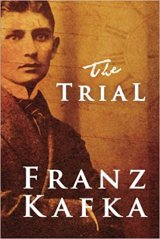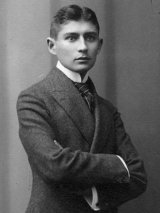The Trial Page #3
The Trial is a novel written by Franz Kafka between 1914 and 1915 and published posthumously on 26 April 1925. One of his best-known works, it tells the story of Josef K., a man arrested and prosecuted by a remote, inaccessible authority, with the nature of his crime revealed neither to him nor to the reader. Heavily influenced by Dostoevsky's Crime and Punishment and The Brothers Karamazov, Kafka even went so far as to call Dostoevsky a blood relative. Like Kafka's other novels, The Trial was never completed, although it does include a chapter which appears to bring the story to an intentionally abrupt ending.
Then he was so startled by a shout to him from the other room that he struck his teeth against the glass. "The supervisor wants to see you!" a voice said. It was only the shout that startled him, this curt, abrupt, military shout, that he would not have expected from the policeman called Franz. In itself, he found the order very welcome. "At last!" he called back, locked the cupboard and, without delay, hurried into the next room. The two policemen were standing there and chased him back into his bedroom as if that were a matter of course. "What d'you think you're doing?" they cried. "Think you're going to see the supervisor dressed in just your shirt, do you? He'd see to it you got a right thumping, and us and all!" "Let go of me for God's sake!" called K., who had already been pushed back as far as his wardrobe, "if you accost me when I'm still in bed you can't expect to find me in my evening dress." "That won't help you," said the policemen, who always became very quiet, almost sad, when K. began to shout, and in that way confused him or, to some extent, brought him to his senses. "Ridiculous formalities!" he grumbled, as he lifted his coat from the chair and kept it in both his hands for a little while, as if holding it out for the policemen's inspection. They shook their heads. "It's got to be a black coat," they said. At that, K. threw the coat to the floor and said - without knowing even himself what he meant by it - "Well it's not going to be the main trial, after all." The policemen laughed, but continued to insist, "It's got to be a black coat." "Well that's alright by me if it makes things go any faster," said K. He opened the wardrobe himself, spent a long time searching through all the clothes, and chose his best black suit which had a short jacket that had greatly surprised those who knew him, then he also pulled out a fresh shirt and began, carefully, to get dressed. He secretly told himself that he had succeeded in speeding things up by letting the policemen forget to make him have a bath. He watched them to see if they might remember after all, but of course it never occurred to them, although Willem did not forget to send Franz up to the supervisor with the message saying that K. was getting dressed. Once he was properly dressed, K. had to pass by Willem as he went through the next room into the one beyond, the door of which was already wide open. K. knew very well that this room had recently been let to a typist called 'Miss Bürstner'. She was in the habit of going out to work very early and coming back home very late, and K. had never exchanged more than a few words of greeting with her. Now, her bedside table had been pulled into the middle of the room to be used as a desk for these proceedings, and the supervisor sat behind it. He had his legs crossed, and had thrown one arm over the backrest of the chair. In one corner of the room there were three young people looking at the photographs belonging to Miss Bürstner that had been put into a piece of fabric on the wall. Hung up on the handle of the open window was a white blouse. At the window across the street, there was the old pair again, although now their number had increased, as behind them, and far taller than they were, stood a man with an open shirt that showed his chest and a reddish goatee beard which he squeezed and twisted with his fingers. "Josef K.?" asked the supervisor, perhaps merely to attract K.'s attention as he looked round the room. K. nodded. "I daresay you were quite surprised by all that's been taking place this morning," said the supervisor as, with both hands, he pushed away the few items on the bedside table - the candle and box of matches, a book and a pin cushion which lay there as if they were things he would need for his own business. "Certainly," said K., and he began to feel relaxed now that, at last, he stood in front of someone with some sense, someone with whom he would be able to talk about his situation. "Certainly I'm surprised, but I'm not in any way very surprised." "You're not very surprised?" asked the supervisor, as he positioned the candle in the middle of the table and the other things in a group around it. "Perhaps you don't quite understand me," K. hurriedly pointed out. "What I mean is ..." here K. broke off what he was saying and looked round for somewhere to sit. "I may sit down, mayn't I?" he asked. "That's not usual," the supervisor answered. "What I mean is...," said K. without delaying a second time, "that, yes, I am very surprised but when you've been in the world for thirty years already and had to make your own way through everything yourself, which has been my lot, then you become hardened to surprises and don't take them too hard. Especially not what's happened today." "Why especially not what's happened today?" "I wouldn't want to say that I see all of this as a joke, you seem to have gone to too much trouble making all these arrangements for that. Everyone in the house must be taking part in it as well as all of you, that would be going beyond what could be a joke. So I don't want to say that this is a joke." "Quite right," said the supervisor, looking to see how many matches were left in the box. "But on the other hand," K. went on, looking round at everyone there and even wishing he could get the attention of the three who were looking at the photographs, "on the other hand this really can't be all that important. That follows from the fact that I've been indicted, but can't think of the slightest offence for which I could be indicted. But even that is all beside the point, the main question is: Who is issuing the indictment? What office is conducting this affair? Are you officials? None of you is wearing a uniform, unless what you are wearing" - here he turned towards Franz - "is meant to be a uniform, it's actually more of a travelling suit. I require a clear answer to all these questions, and I'm quite sure that once things have been made clear we can take our leave of each other on the best of terms." The supervisor slammed the box of matches down on the table. "You're making a big mistake," he said. "These gentlemen and I have got nothing to do with your business, in fact we know almost nothing about you. We could be wearing uniforms as proper and exact as you like and your situation wouldn't be any the worse for it. As to whether you're on a charge, I can't give you any sort of clear answer to that, I don't even know whether you are or not. You're under arrest, you're quite right about that, but I don't know any more than that. Maybe these officers have been chit-chatting with you, well if they have that's all it is, chit- chat. I can't give you an answer to your questions, but I can give you a bit of advice: You'd better think less about us and what's going to happen to you, and think a bit more about yourself. And stop making all this fuss about your sense of innocence; you don't make such a bad impression, but with all this fuss you're damaging it. And you ought to do a bit less talking, too. Almost everything you've said so far has been things we could have taken from your behaviour, even if you'd said no more than a few words. And what you have said has not exactly been in your favour."
Translation
Translate and read this book in other languages:
Select another language:
- - Select -
- 简体中文 (Chinese - Simplified)
- 繁體中文 (Chinese - Traditional)
- Español (Spanish)
- Esperanto (Esperanto)
- 日本語 (Japanese)
- Português (Portuguese)
- Deutsch (German)
- العربية (Arabic)
- Français (French)
- Русский (Russian)
- ಕನ್ನಡ (Kannada)
- 한국어 (Korean)
- עברית (Hebrew)
- Gaeilge (Irish)
- Українська (Ukrainian)
- اردو (Urdu)
- Magyar (Hungarian)
- मानक हिन्दी (Hindi)
- Indonesia (Indonesian)
- Italiano (Italian)
- தமிழ் (Tamil)
- Türkçe (Turkish)
- తెలుగు (Telugu)
- ภาษาไทย (Thai)
- Tiếng Việt (Vietnamese)
- Čeština (Czech)
- Polski (Polish)
- Bahasa Indonesia (Indonesian)
- Românește (Romanian)
- Nederlands (Dutch)
- Ελληνικά (Greek)
- Latinum (Latin)
- Svenska (Swedish)
- Dansk (Danish)
- Suomi (Finnish)
- فارسی (Persian)
- ייִדיש (Yiddish)
- հայերեն (Armenian)
- Norsk (Norwegian)
- English (English)
Citation
Use the citation below to add this book to your bibliography:
Style:MLAChicagoAPA
"The Trial Books." Literature.com. STANDS4 LLC, 2025. Web. 22 Feb. 2025. <https://www.literature.com/book/the_trial_1052>.








Discuss this The Trial book with the community:
Report Comment
We're doing our best to make sure our content is useful, accurate and safe.
If by any chance you spot an inappropriate comment while navigating through our website please use this form to let us know, and we'll take care of it shortly.
Attachment
You need to be logged in to favorite.
Log In